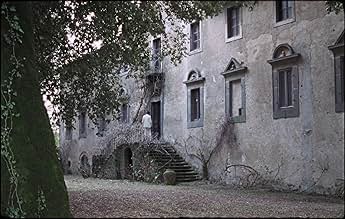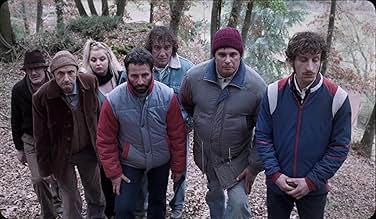Der englische Archäologe Arthur trifft sich wieder mit seinen unberechenbaren Komplizen - einem fröhlichen Kollektiv von Grabräubern, die durch das Plündern etruskischer Gräber und das Horte... Alles lesenDer englische Archäologe Arthur trifft sich wieder mit seinen unberechenbaren Komplizen - einem fröhlichen Kollektiv von Grabräubern, die durch das Plündern etruskischer Gräber und das Horten der ausgegrabenen antiken Schätze überleben.Der englische Archäologe Arthur trifft sich wieder mit seinen unberechenbaren Komplizen - einem fröhlichen Kollektiv von Grabräubern, die durch das Plündern etruskischer Gräber und das Horten der ausgegrabenen antiken Schätze überleben.
- Regie
- Drehbuch
- Hauptbesetzung
- Auszeichnungen
- 14 Gewinne & 53 Nominierungen insgesamt
Empfohlene Bewertungen
I did enjoy this movie. Josh O'Connor and all of the cast deliver stellar performances. I settled down to watch a slow burn and indeed it is just that, but maybe a little to slow. I found myself hoping something more would happen. Every actor in this movie is wonderful, but towards the last half hour I just wanted it to wrap up. When it finally did wrap up, it was a bit of a damp squib. It was obviously coming and was no surprise. Most of the dialogue is Italian but subtitles don't worry me. Everything about this movie is great and I would not point fingers at the script writers or the actual dialogue. I just had issues with the strength of the actual story line. I think it may become a lost gem. It does not have mass appeal, but that is a trademark of Josh O'Connor; he just does the stuff that he wants and what challenges him. I cannot think of anything I have seen him in that was not brilliant, and this movie is up there, but only for a limited and mainly Italian audience. However, happy it was made. It is original, beautifully cast, thoughtful sets and wardrobe. Thanks.
The enchanting allure of La chimera smoothly treads between myth and romance, where fantasy is no longer unimaginable but a transformative possibility found where the lines between dream and memory are often blurred by formal unpredictability.
Its inheritance of Italian Neorealism and Felliniesque carries within a history of emotion and style. The aesthetics aren't just a choice. They're a statement of timeless beauty. A beauty magnified by the story of Arthur, a looter involved in the black market of historical artifacts with a gift to sense where they are, that channels the grace of an irretrievable past. Josh O'Connor's contrast with the rest of the cast not only enhances the film's fascination with the dreamy yet earthy sublime but also adds elements of mystery and melancholy through the protagonist's barely hinted past.
Alice Rohrwacher's La chimera eventually develops a recognizable shape, but it doesn't sacrifice its artistry, and that's the beauty of it.
Its inheritance of Italian Neorealism and Felliniesque carries within a history of emotion and style. The aesthetics aren't just a choice. They're a statement of timeless beauty. A beauty magnified by the story of Arthur, a looter involved in the black market of historical artifacts with a gift to sense where they are, that channels the grace of an irretrievable past. Josh O'Connor's contrast with the rest of the cast not only enhances the film's fascination with the dreamy yet earthy sublime but also adds elements of mystery and melancholy through the protagonist's barely hinted past.
Alice Rohrwacher's La chimera eventually develops a recognizable shape, but it doesn't sacrifice its artistry, and that's the beauty of it.
A rather scruffy looking Josh O'Connor is "Arthur" who has found a way to make a living in rural Italy where he uses his unique gift with a divining rod - well a big twig, really - to uncover ancient artefacts from deep beneath the surface. He's not averse to a bit of grave robbing either - for which he has recently been imprisoned, and now he and his cohorts sell their stuff to "Spartaco" (Alba Rohrwacher) and via a rather unique technique, too! What's clear is that "Arthur" is getting over something fairly monumental in his life, and we get a clue to that when he visits the rather doting but blissfully ignorant and elderly "Flora" (Isabella Rossellini) at her increasingly dilapidated mansion house where the furniture is destined for the furnace and her family all know the secret, but dare not speak it. He, himself, inhabits a shanty-town style shed abutting the old city wall, his once proud linen suit now grubby and filthy and he is rarely without a cigarette. As the plot unfolds - aided by an agreeably sparing amount of dialogue - we start to get a sense that "Arthur" is actually coming to his senses after something akin to a concussion. The pieces of his life are slowly coming together again as he and his pals make the discovery of a lifetime, only for... It's a slowly paced film, but that works well - as do the infrequent but quite punchy comedic elements of the drama. There can be a comparison drawn between the gradual unearthing of the long lost relics and with his own re-realisation but it's all delivered with a brightness that keeps it from becoming downbeat or depressing. Director Alice Rohrwacher offers us a personal story tempered with a bit of mythology and a fair degree of ill-defined humanity that is compellingly incomplete in many ways. I reckon it might merit a second watch, there's plenty of nuanced writing here.
When an English tomb raider (Josh O'Connor) skilled at dowsing uses his skills to hunt down buried Etruscan artifacts, he achieves success at his craft but suffers setbacks when he falls in with the wrong crowd. As a consequence, he drifts through life, trying to find his way (and, ironically enough, a moral footing), an odyssey filled with quirky people and events, a would-be romantic interest (Carol Duarte) with two carefully concealed children, an aging operatic instructor (Isabella Rossellini) skilled at fleecing her "students," and, of course, his coterie of comical criminal cronies. Writer-director Alice Rohrwacher's latest tells a delightful fable full of wit, whimsy, colorful characters, high intrigue and its share of surreal moments, all set against the Italian landscape. The film admittedly takes a little time to find its stride, so getting through the opening act will require some patience (editing here would have helped). But, once the picture finds its way, it becomes a fun-filled ride, peppered with absurdist humor and filmed with Fellini-esque cinematography and a production design reminiscent of the famed auteur. With a runtime of 2:10:00, it could stand some trimming (most notably at the outset, as noted above), but this cinematic charmer is a modestly pleasant diversion to watch while stretched out on the couch while casually savoring a demitasse of espresso and a plate of biscotti. Godere!
Arthur, the disheveled former archaeologist turned Etruscan tomb-finder, is a man on a quest. When we first meet him, he is dreaming on a train heading home after being released from prison. Once home, he soon falls in with his old gang of tombaroli (grave-robbers) and they're on the search for treasure in the earth. For the rest of the gang, treasure means loot from Etruscan tombs; Arthur seems to be searching for something else. We get clues to Arthur's search in recurring images of a young woman and her red thread first seen in the opening shots of the film. The woman, we soon learn, is Beniamina, the daughter of Flora and Arthur's beloved. Flora lives in a crumbling palazzo with Italia, her singing student, and a group of women who call Flora mother. Italia is being exploited as a servant by Flora, who believes she is tone-deaf, but Italia in turn is raising two children in the house unbeknownst to Flora. The film juxtaposes these two kinds of groups: the rival groups of tombaroli led by men and the communal groups led by women (Italia forms the second group in a disused railway station), which echoes the remark early in the film that Italy would be much less macho today if the Etruscans had beaten the Romans rather than the other way around.
The film is full of mythic and historical resonances. Arthur is a latter-day Orpheus searching for his Eurydice (the first musical cue is from Monteverdi's Orfeo), but without Orpheus's gift of music. The red thread recalls Ariadne and the labyrinth. Flights of birds (and ominous pigeons) follow Arthur. Italia's first language is Portuguese and her children are of many ethnicities. And so on. In the hands of a lesser director or screenwriter this hybrid creature of different parts (you might call it a chimera) could have been a mess, but here everything seems to cohere and to create a mythic world that resembles our own, but is at an angle to it. That everything clicks into place so precisely and beautifully in the final scene is a tribute to just how tightly this loose-seeming film is constructed. Rarely have the loose threads of a plot been gathered with as much skill or in a more satisfying way.
Many of the photographic tricks (different film stocks, different aspect ratios, scenes undercranked) sound gimmicky, but, except for the undercranking, most are there for people who notice and transparent to those who don't. The cast is uniformly excellent.
For all its playfulness and its conceits, this moving, elegiac film tells the story of a great love and is a great love story.
The film is full of mythic and historical resonances. Arthur is a latter-day Orpheus searching for his Eurydice (the first musical cue is from Monteverdi's Orfeo), but without Orpheus's gift of music. The red thread recalls Ariadne and the labyrinth. Flights of birds (and ominous pigeons) follow Arthur. Italia's first language is Portuguese and her children are of many ethnicities. And so on. In the hands of a lesser director or screenwriter this hybrid creature of different parts (you might call it a chimera) could have been a mess, but here everything seems to cohere and to create a mythic world that resembles our own, but is at an angle to it. That everything clicks into place so precisely and beautifully in the final scene is a tribute to just how tightly this loose-seeming film is constructed. Rarely have the loose threads of a plot been gathered with as much skill or in a more satisfying way.
Many of the photographic tricks (different film stocks, different aspect ratios, scenes undercranked) sound gimmicky, but, except for the undercranking, most are there for people who notice and transparent to those who don't. The cast is uniformly excellent.
For all its playfulness and its conceits, this moving, elegiac film tells the story of a great love and is a great love story.
Wusstest du schon
- WissenswertesJosh O'Connor filmed the first half of La Chimera prior to filming his role as Patrick Zweig in Challengers, then returned to Italy to complete the second half.
- SoundtracksToccata-Ritornello-Sinfonia
Taken from "L'Orfeo"
Composed by Claudio Monteverdi
Performed by Le Concert des Nations & La Capella Reial de Catalunya
Conducted by Jordi Savall
Top-Auswahl
Melde dich zum Bewerten an und greife auf die Watchlist für personalisierte Empfehlungen zu.
- How long is La Chimera?Powered by Alexa
Details
- Erscheinungsdatum
- Herkunftsländer
- Sprachen
- Auch bekannt als
- La quimera
- Drehorte
- Produktionsfirmen
- Weitere beteiligte Unternehmen bei IMDbPro anzeigen
Box Office
- Budget
- 9.600.000 € (geschätzt)
- Bruttoertrag in den USA und Kanada
- 1.004.503 $
- Eröffnungswochenende in den USA und in Kanada
- 44.511 $
- 31. März 2024
- Weltweiter Bruttoertrag
- 5.233.888 $
- Laufzeit2 Stunden 11 Minuten
- Farbe
- Sound-Mix
- Seitenverhältnis
- 1.78 : 1
Zu dieser Seite beitragen
Bearbeitung vorschlagen oder fehlenden Inhalt hinzufügen































